Last Call - The Rise and Fall of Prohibition by Daniel Okrent(audio book)mp3)[rogercc][h33t]
seeders:
0
leechers:
1
updated:
Download
Fast Safe Anonymous
movies, software, shows...
Files
Disc 01
DescriptionLast Call: The Rise and Fall of Prohibition - Daniel Okrent Quote:
From the Author
The idea for Last Call arose from my research, back in the 1990's, for Great Fortune, my history of Rockefeller Center, published in 2003. To assemble the property on which the Center was built, John D. Rockefeller Jr. had to acquire the ground leases on 228 buildings, mostly decrepit row houses, between Fifth and Sixth Avenues -- the heart of what was Manhattan's speakeasy district. Looking through city records, I found the Rockefeller agents tangling with various speakeasy owners -- and it turned out that many of them had more political clout than the Rockefellers. This is the sort of thing that gets a book started. What gave it fuel was the continual revelations that popped up in my research. I knew that much of the Prohibition movement was religiously motivated -- but I hadn't known that the allies of the era's "religious right" included large segments of the women's suffrage campaign, the Progressive Party, and other reform movements. I knew that drinking continued during Prohibition -- but I hadn't known that much of it was sanctioned by the Volstead Act, in the form of "medicinal liquor" (doctors sold prescriptions for three bucks each), "sacramental wine" (which, in some instances, was stretched to include sacramental brandy and Champagne), and "preserved fruit" (aka hard cider and applejack). I knew that crime was rampant in the 1920's -- but I hadn't known that trans-national organized crime was the direct consequence of Prohibition, which required the cooperation of criminal syndicates in many cities because of the complications of shipping millions of gallons of liquor from place to place. Quote:
Daniel Okrent
Daniel Okrent's 40-year career has encompassed nearly every form of mass media. In book publishing, he was an editor at Knopf, Viking, and Harcourt. In magazines, he founded the award-winning New England Monthly and was chief editor of the monthly Life. In newspapers, he was the first public editor of the New York Times. On television, he has appeared as an expert commentator on many network shows, and talked more than any other talking head in Ken Burns's Baseball. In film, he was featured in the documentaries Wordplay and Silly Little Game, appeared in a speaking role in Woody Allen's Sweet and Lowdown, and had what he calls "a mumbling role" in Lasse Hallstrom's The Hoax. Online, he headed Time Inc.'s internet efforts in the late 1990's, and has recently given in to the dubious charms of Facebook. But all that, he says, was either preparation for (or distraction from) what he most wanted to do: write books. Beginning with Nine Innings in 1985, and proceeding through the 2010 publication of Last Call, Okrent has been (wrote novelist Kevin Baker in Publishers Weekly) "one of our most interesting and eclectic writers of nonfiction over the past 25 years." In addition to the books featured on this site, he was also co-author with Steve Wulf of Baseball Anecdotes (Oxford University Press, 1987), and author of The Way We Were: New England Then, New England Now (Grove Weidenfeld, 1989), currently out-of-print. Still, despite all of that, Okrent expects that he remains best known (and will one day by eulogized) for inventing Rotisserie (aka "Fantasy") Baseball. He would prefer, however, to be known as the husband of the poet Rebecca Okrent, and father of John Okrent and Lydia Okrent. Trackers
Torrent hash: 544E35BCC6F7383C1DF51BEAADE29E52BE6D61CC |

